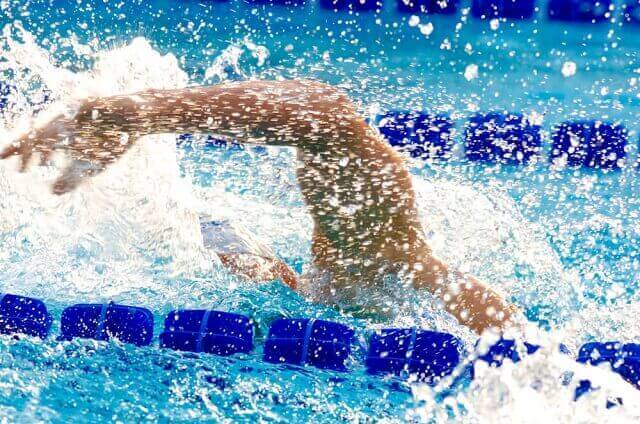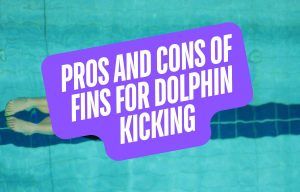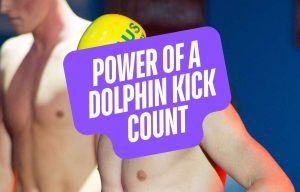For most swimmers, the difficulty in being injured isn’t the physical. It’s the mental struggle of returning to full health. Here’s how to stay sane when an injury hits you.
Training will be going, well, swimmingly, and out of the blue we will suffer an injury. Or perhaps it is that chronic injury we thought we finally had a lid on that pops back up and stings us for what feels the millionth time. In both cases, the resulting feelings are the same.
Frustration. Anger. Depression.
A feeling that time and ground is being lost that can and will never be made up. A sense that we are not in control of our own destiny anymore. Guilt from not being able to help out with the team. And the inevitable negative thinking that comes packaged with an injury that leads us to miss training or even competition.
It’s an awful set of feelings.
Here are a few of the ways that we deal mentally with being injured:
- Heightened anxiety of further injury.
- Denial of how severely you’re injured.
- A general frustration and impatience.
- Over-analysis of symptoms.
- Disengagement from the team.
- Mood swings and general grumpiness.
- Frustrated and disturbed sleep.
- A sense of isolation within the team.
- A drop in motivation that turns to apathy over time.
- Changes in appetite.
- Anger and even depression.
- Guilt from not being able to play a more constructive role within the team.
- And of course, an obsessed focus on when they can return to action.
Swimmers who have been injured before, and who are well aware of the mental roller coaster that comes with the process of recovering from injury, may cover up their injuries and swim through them.
SEE ALSO: How to Prevent Swimmer’s Shoulder
At the end of the day, getting a handle on your injury is what is going to get you back to swimming at full capacity the quickest.
The first step is to come to terms with the fact that you are banged up.
Self-awareness is a very underrated and little-talked about skill among swimmers.
With a little bit more self-awareness we would better perceive our limits, understand when to push our bodies and when not to, and even set much better and ultimately attainable goals. (Key distinction: not easier, but more likely to be attained. The difference is subtle but distinct.)
When you come to terms with the injury and actually accept it—instead of beating yourself up as being weak, or inferior, or not good enough—you can begin the process of healing both physically and mentally.
An athlete who tells themselves they are weak, or not good enough, or a “pussy” will try to push through injury, typically re-aggravating or further aggravating the problem.
How to Get Yourself Back to 100% Both Physically and Mentally
When I was 18 I, like many swimmers over the course of their careers, had a banged-up shoulder. It had been a recurring issue, leading me to miss significant chunks of training. I had done so much kicking with fins that my feet had developed a series of leathery calluses that looked like a second set of knuckles.
The psychological effect of it was worse.
Both because it wasn’t the injury wasn’t very well explained to me (“Oh, it’s typical. Part of the process,” was the quote from one coach) and the overwhelming amount of information online I was dumbfounded and frustrated.
After a couple of months of the shoulder clearly not getting better I was referred to one of the top athletic therapists in the area. When I walked in, I began to feel more like a can of Spam on a conveyor belt. Another check to be cashed.
The therapist barely stopped to ask what my discipline was in the pool, how long I had been swimming for, and how long I had been injured.
I tried to explain these little tidbits about my personal training history, but he would interrupt with a screening movement that felt like someone was stabbing me in the shoulder with a steak knife.
He yanked my shoulder this way and that, while throwing some big words at me that I didn’t understand. With my free hand I rushed to scribble out some of what he was saying.
Most fundamentally, I wanted to understand what was going on so that I could just get back on track in the gym and in the pool.
The simple “why?” to why I was hurt.
That was perhaps the worst part of the whole thing. If there was a clear A-B line, a simple cause-and-effect, a culprit that I could look at and say, “That is why I am injured,” than I knew I could set myself on the track to fixing it, healing up, and getting back on track in the pool.
When I walked out that day with a rubber band and a set of exercises to do each day I didn’t feel any better about the injury.
If anything, I felt worse.
Here a few ways for you to battle back against the emotional roller coaster that comes along with being injured:
1. Seek treatment.
After reading the list of psychological symptoms of being perpetually injured above it might be hard to imagine why anyone would still be reticent to seek out treatment.
You might view treatment as a sign of weakness, or downplaying the severity of your injury in orer to not miss out on valuable training and competitive opportunities. You might not be used to having to struggle through injury, or you simply might not have the healthiest mechanisms in place for dealing with setbacks (“If I’m not a swimmer, who am I?”).
Whatever the case may be, give yourself permission to seek treatment.
2. Have trust with your practitioner.
Easier said than done, as illustrated by my experience above, but when you are undergoing treatment you want a sense of trust and care from the therapist you work with.
After all, when you are injured, you are vulnerable. You’ll believe anything and everything if you think it will make you feel better.
When you are able to work with a therapist who acutely listens to your dilemma—no matter how many times he or she has seen someone in your condition before—it goes a long way in establishing trust in the treatment and recovery protocols they give you.
The reality is that you are more likely to follow the rehab program if you believe that the people you are working with have your best interests at heart.
3. Gain control by educating yourself.
This is a decidedly double-edged sword.
With the avalanche of information out there regarding an injury you can quickly get lost in possible reasons for why you are banged up. (If you are Googling or WebMD’ing symptoms for your shoulder, at some point a diagnosis will tell you that you have cancer. Or diabetes.)
Being properly informed and educated on why we are injured gives us a sense of control. It’s not “I don’t know why this is happening to me” anymore, and becomes, “I know what’s wrong, and here’s how to fix it.”
An essential part of this is also being able to understand the misinformation that is associated with your respective injury. There is a stunning amount of bro-science out there when it comes to swimming-related injury, and often leads to unnecessary confusion and frustration when we let it go unchecked.
4. Lean on your social support.
Having a strong backstop of people who care about you during the course of recovering from an injury is paramount.
It’s natural that a lot of the people in your trust tree are likely swimmers given the amount of time we spend in the water on a weekly basis and might make it harder to stay connected when we are dry-docked.
Don’t underestimate the mental and physical benefits of having our social circle strong around us.
5. Keep your motivation strong by keeping your mental game tight.
Easier said than done, right? Here are a few ideas to stay positive:
- Have perspective. The daily struggle of being injured fully and completely stinks. I get it. But for a moment look past today, and look a couple of weeks or months from now. When you are starting to feel overwhelmed and frustrated by today’s lack of progress think long-term. In the grand scope of your career in the water, today will barely register.
- Vow to come back stronger and smarter. While you are injured it’s a great time to put together the pieces for how you are going to come back with more determination than ever. This should include a pre-hab plan to ward off similar injuries in the future—something that you should stick to whether or not you are beginning to experience symptoms again.
- Focus on the things you can do. Injured shoulder? Develop a kick so powerful that it drowns the competition and improve that awful hamstring flexibility of yours. Injured knee? Improve your core strength, spend time on the stretch cords, and improve your upper body strength. With the injuries that are most typical to swimmers—shoulders and knees—there will always be something you can do to continue to move forward. And seriously, it can always be worse. Always.
In Summary
After that experience as an 18-year old I left the sport for a year. When I eventually returned to the water, on a friend’s recommendation I pre-emptively went and saw a local physical therapist who had experience with swimmers.
She listened carefully to what I had gone through with my prior therapist, appreciated my concern for re-injury, and was able to “diagnose” why I was having so many problems beforehand. (Poor posture, as it turned out.)
Buoyed by the sense of control, and of feeling like there was a way forward that didn’t have to include significant re-injury, I was able to go back to training feeling remarkably confidant. I had a sense that I could manage my injury, and that type of feeling is all a swimmer truly wants when dealing with an injury.
Remember that by giving yourself permission to seek treatment, having good care, leaning on your support group, and a little bit of patience you will be back in the water soon enough.
Want help with your mindset?
Check out our mental training book, Conquer the Pool: The Swimmer’s Ultimate Guide to a High-Performance Mindset for more information on how to be mentally bullet-proof. Click here to learn more.














